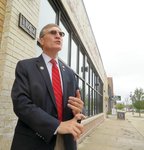





On a cloudy Saturday in October, along one of the main drags in southwest Lansing, motorists spied a man walking across a muddy residential yard with a shovel in his hand and a picket fence of pearly white teeth.
It wasn’t the first time Ingham County Treasurer and Land Bank Chairman Eric Schertzing has been spotted on a weekend, without his deal-closing suit and portfolio, helping a homeowner with a paint job or a shrub transplant after a Land Bank sale.
But it might be one of the last.
After 21 years as county treasurer, Schertzing, 59, has decided to turn in his county seal in March and leave his post about halfway through his sixth term. He will leave the office to his chief deputy, Alan Fox, until a committee of county officials picks a replacement.
Schertzing’s three kids, as he put it, have all “launched” and finished college. Schertzing and Nancy, his wife of 36 years, will act on long deferred plans to return to Washington, D.C., to continue her training in restorative justice work at the national level. “Nancy had a wonderful job she loved,” said Schertzing, but she gave it up to allow him to pursue professional and personal interests back home. Now he is returning the favor.
“Nancy and I decided it’s time for a new adventure,” he said. “It’s been an honor to serve the county.”
Schertzing toggles from bland platitudes to frank confessions with disarming ease. He admitted that just the idea of doing an exit interview had him “jangled.”
“It’s a powerful thing,” he said. “There’s a lot of emotions to go through. I don’t think one should lightly leave elective office. I’m not thrilled in some ways, but the timing is right.”
Millions of people are making life changes in the wake of the pandemic. Schertzing admitted that it’s hard to sort out all the murk that’s bubbling up.
“There’s a level of discomfort and stress that we’re all going through that we don’t really recognize,” he said. “I see it in my friends and colleagues.”
One thing is clear: Schertzing’s departure isn’t a routine shuffling of folding chairs in an obscure government office. In his capacity as Land Bank chairman alone, Schertzing’s work has permeated every neighborhood, indeed nearly every block of the city. The Land Bank also had a hand in several of Lansing’s most significant recent developments, including the redevelopment of the School for the Blind property and the Capital City Market/Courtyard Marriott project downtown.
Michigan is catching up with him. When the Ingham County Land Bank was founded 16 years ago, it was only the state’s second, after Genessee County’s. Now 43 counties have land banks. Last week, Schertzing and his team hosted the state land bank conference — at the Courtyard Marriott, of course.
Land Bank director Roxanne Case has worked with Schertzing for 12 years.
“Eric is a big picture guy and always has been,” Case said. “He’s hard to read sometimes. There’s a lot floating around in that head of his that’s always interesting, for sure. There’s definitely going to be a void in the county when he leaves.”
Newfound friends
It’s easy to roll your eyes when Schertzing shrugs that he’s a Stockbridge “farm boy” — as he did many times while running for office — but he’s clearly as comfortable with a shovel or a paint brush as he is behind a desk, closing deals and signing checks.
The day he was spotted on the west side of Lansing with the shovel, he was helping a 67-year-old homeowner settle into a home sold by the Ingham County Land Bank.
The buyer was fresh out of prison, where he’d served 35 years for criminal sexual conduct. Friday and Saturday afternoon, Schertzing was putting primer on the north side of the house. He delivered some tools to help the man put in sod.
“He made a bad decision,” Schertzing said. “Before they threw away the key on him, he was a property owner and a trainer of commercial pilots, a smart guy.”
Schertzing works with local judges and Monica Jahner, who runs a prison re-entry support program at Northwest Initiative, to help ex-prisoners find housing.
“These folks struggle,” Schertzing said. “They’ve got a record. Employment is hard. Who wants to rent to them — that’s hard. If we can figure out a way for industrious people to have home ownership, it’s probably easier than having them deal in the rental market.”
Schertzing works both sides — or, more accurately, multiple sides — of the foreclosure process. He contracts with Capital Area Community Services, or CACS, to the tune of $100,000 a year or more, for tax foreclosure prevention counseling. He has served on the boards of CACS, the Head Start Policy Council and the Lansing Urban Farm Project Authority. “So many things are connected,” he said. His understanding of the foreclosure process has evolved over the years.
“It’s people who are vulnerable, disempowered, struggling, on the ropes,” he said. “The deck is stacked against them and you’ve got to figure out ways to help them.”
The Land Bank’s core mission is that of a residential dentist. If neglected houses are like teeth, it falls to the Land Bank to decide where to put in bridgework, where to do a root canal, which ones to polish and which ones to pull. Auction sales are often restricted to buyers who commit to occupying their home and, in some instances, to keeping its historic features.
“The idea is to keep it from bottom feeders, out-of-state folks who come in and buy up huge chunks of land,” Allen Neighborhood Center director Joan Nelson said.
To determine whether a tax-foreclosed property would best be demolished, renovated or given a minor facelift, the Land Bank team first does an inspection.
Roxanne Case recalled a memorable inspection of a property on Lathrop Street that teemed with fleas, as many abandoned homes do.
“Only a few of us went inside this house, for one reason or another,” Case recalled. “Fifteen minutes later, Eric came scrambling out, covered in fleas, taking off his shirt and waving his arms. He was willing to share his newfound friends with all of us.”
‘Wow, I’ve left the farm’
Last Thursday afternoon, Schertzing dropped by a REO Town office to close three land deals. Briefcase in hand, he looked like he was born in a dark blue suit with the county seal on his lapel.
In fact, Schertzing’s life was shaped by a series of unexpected encounters. Monday night, after the state conference of land banks wrapped for the day in downtown Lansing, he had a spell of time-travel vertigo. He and three dozen colleagues from around the state repaired to unwind and debrief at the Arcadia Brewing Co. on the east side. Looking out the window, he spotted a familiar vacant lot across Michigan Avenue.
He forgot about his pulled pork and hard cider. His thoughts drifted back to 1982.
“I spent the second half of that year in a doublewide trailer, on that lot, running the office for Bob Carr for Congress,” he recalled.
Going into politics wasn’t a rebellion for Schertzing. His dad worked hard as a farmer, but he took time for involvement in local politics.
“Walter Cronkite was on at 6:30, Newsweek came to the house every week,” he said. “I remember the body bags coming back from Vietnam when I was 8 years old. This was kind of printed on me from my childhood.”
Schertzing met Carr on a field trip to Washington in ninth grade. He worked for Carr’s comeback campaign in 1982, as a sophomore at the James Madison College at Michigan State University. Carr served nine terms in Congress, representing mid-Michigan.
To his delight, Schertzing met House Speaker Jim Wright at a D.C. fundraiser for Carr.
“I’m caught up in a nationally covered congressional campaign,” he recalled. “A 20-year-old kid meeting Jim Wright in 1982 was like, ‘Wow, I’ve left the farm.’”
Schertzing spent eight years, from 1983 to 1991, as Carr’s legislative aide in Washington. It didn’t escape his notice that by the 1980s, Carr himself was evolving from the rhetoric of a self-described “angry young man” to quiet, effective work on budget and spending issues.
The logical next step was for Schertzing to run for public office himself, but it did not work out. In 1992, Schertzing ran for the 67th Michigan House District, losing to Republican Dan Gustafson 54% to 46%. He flirted uneasily with the real estate business but itched to return to government.
He found a kindred spirit in newly minted Ingham County Drain Commissioner Pat Lindemann.
At a marathon dinner in the front booth of the old Emil’s Restaurant, on Lansing’s east side, Schertzing and Lindemann talked into the night. The environmentally conscious drain commissioner, who needs only hear the word “water” to rhapsodize about rain gardens and swales for an hour, inspired Schertzing — and hired him as deputy commissioner.
“We hit it off,” Schertzing said. “Pat taught me to think big and care even more about the environment than I already did.”
Despite sharp differences in style and temperament, Schertzing and Lindemann dealt from the same playbook. By serving decades in a relatively low profile but powerful office, they both made a lasting mark on the landscape — literally — and largely avoided the daily drama that dogs senators, mayors and council members. In 2000, Schertzing defeated Republican Kirk Squiers to become Ingham County’s first Democratic county treasurer since 1922.
“The reason my treasurer work, county government, is so satisfying is that you’ve got some control over what happens every day and you can get shit done,” he declared.
Dental school
For Schertzing, “getting shit done” as county treasurer began in earnest with another unexpected encounter.
Back in 2005, State Rep. Dan Kildee of Flint tried to warm a reluctant Schertzing to the concept of a land bank, to fast-track tax-reverted property to productive use and shore up plunging property values in key neighborhoods. (Genessee County established the state’s first land bank in 2004.) It took a while for Schertzing, a proud Lansing booster, to accept the idea that the capital city needed the kind of residential dental work Flint or Detroit did.
“But we did, and we do,” Schertzing said. “Dan knew that land banks weren’t just a desperation move.”
The timing was more propitious than anyone, including Kildee or Schertzing, could have known.
“We had no idea, when we were putting it together, of the scale of the emerging mortgage refinancing fraud boom that would rip through the neighborhoods of Lansing — that we would be dealing with thousands of properties that were foreclosed,” Schertzing said. “By 2006, you could feel the tremor, and by 2007 it would be very clear.”
While in its infancy, the Land Bank was slammed with a tsunami of tax and mortgage foreclosures — over 2,000 a year at the height of the Great Recession.
Now it’s impossible to trot out to Quality Dairy for a long john without passing a parcel that has gone through the Land Bank’s hands. For the record, here are the numbers: In 16 years, the Land Bank has invested $58 million in federal, state and local funds to renovate 255 single-family homes, built 42 new single-family homes, established nearly 200 garden parcels comprising 34 acres, demolished about 800 buildings, sold over 600 vacant lots and brokered the sale of over 20 commercial properties for development. The Land Bank still has about 700 residential, commercial and industrial vacant lots, most of them in Lansing.
On a more limited scale, Land Bank parcels have been key chess pieces in putting together some significant recent projects in Lansing.
The Capitol City Market/Marriott Courtyard project coalesced around a Land Bank property, a tax-foreclosed Mobil gas station at the highly strategic corner of Larch Street and Michigan Avenue, catty-corner from Lugnuts Stadium and two blocks from the state Capitol.
The Land Bank sold the derelict corner property to Pat Gillespie. Gillespie’s sign caught the attention of a real estate vice president at the Meijer Corp.
“He called Pat and said, ‘I want to put up a store there,’” Schertzing said. “That was the foundation of it.”
As Gillespie assembled a patchwork of over 20 parcels, including a house and vacant lot on Barnard Street owned by the Land Bank, the project grew to encompass not only Capital City Market, but a hotel and apartment complex two blocks from the state Capitol.
“If we had no Land Bank, and my only option was to sell it at tax auction, it would probably still be a shitty little gas station,” Schertzing said. “It started by having that sign in the right place. And here we are, having a conference at the Marriott, the urban food desert is largely solved for the downtown, and there’s more apartments.”
Case said the whole idea of banking land, rather than flipping it as fast as possible, was a risk, citing the Courtyard Marriott/Capital City Market complex as an example. “Holding those properties for as long as we did — the city wanted us to just build residential property,” Case said. “I hate to say we were bucking the system, but it’s costly to hold and maintain them and that’s part of the risk.”
Produce and preservation
Schertzing’s Bunker Hill Township farm roots have shaped the urban fabric of Lansing in more ways than one. The city’s east side is turning into a garden hub, with a dozen urban farms.
Allen Neighborhood Center director Nelson served with Schertzing on the Lansing Urban Farm Project board in its early years.
“When houses in the flood plain were demolished, Eric saw the value of using those parcels to grow food and leasing them at affordable rates, including non-contiguous but nearby parcels,” Nelson said.
Support for local food is a mainstay of Nelson’s broader vision for the east side. Most of the Allen Neighborhood Center’s programs and projects, culminating in the new Allen Place development nearing completion on Kalamazoo Street, trace their roots to nearby urban farms.
“The first one, Urbandale Farm was kind of a dream back then,” Nelson said. “But Eric was out there every Saturday, pulling weeds, helping to build the greenhouse, figuring out how to support the farm manager.”
Schertzing supplied new farmers with tools, helped establish apprentice programs and negotiated deals with the Board of Water & Light for utility needs.
“Because he was on the ground, literally, so often, with the urban farmers, he was able to find out what they need and develop the resources and support for them. He negotiated deals with the Board of Water and Light for utility needs.”
Historic preservation, another Schertzing passion, is a tougher nut to crack than urban farming, but the Land Bank has been quietly nudging the city toward keeping its historic homes.
Each year since 2014, members of Preservation Lansing have huddled with Schertzing’s staff to pick out two or three historic houses from the tax foreclosure list. A historic preservation covenant is attached to the sale of the houses. Members of Preservation Lansing monitor the renovation of the homes to make sure it conforms to the Interior Department’s standards.
The Land Bank compensates Preservation Lansing for the expertise, to the tune of two or three thousand dollars a year — a major boost to the non-profit’s thin budget.
A long-vacant 1874 house designed by Lansing’s most prominent architect, Darius Moon, at 108 S. Martin Luther King Jr. Blvd., was sold at the 2019 tax foreclosure auction and was put under a historic preservation covenant. (Moon lived in the house, the first one he designed, for several years.) The new owner, Alesia Flowers, is doing extensive renovations to bring the house back to its historic glory.
“It wouldn’t happen without Eric,” Preservation Lansing President Dale Schrader said. “He developed it and he was the first treasurer in the state to do something like this.”
Schertzing is also moving the county toward demolition salvage (“deconstruction”) versus total demolition.
“You’ve got all this 300-year-old hardwood, old growth forest lumber inside these houses,” Schrader said. “It all goes to the landfill — doors, historic moldings, windows and all of that.” Case, who has supervised most of the county’s demolitions in the past decade, is enthusiastically on board.
Beyond Hamilton
Schertzing is grateful for the opportunity to help people from the position of county treasurer, but he sometimes chafes at the creaky machinery of government. He’s not sure what will come next after he leaves office, but a stint in the private sector might be a tonic. Whatever is next, it may still involve Lansing, where he said he and Nancy will likely maintain a residence as well as in D.C.
“Ingham County will always be home,” said Schertzing, who said he’d like to keep using his skilled hand to “improve housing and land banking” here. “I do expect to be here often.”
He is still the kind of person who keeps the Federalist Papers on his night table. Last week, he re-read Federalist 1, in which Alexander Hamilton — er, Publius — urges the states to adopt a strong federal government to “get shit done,” to borrow a paraphrase.
But lately, Schertzing has been looking longingly at the other side of the coin.
“I get a little heartburn from the regulations and the bureaucracy,” he said. “The Pentagon took 18 months to build.” (Some humble Land Bank bungalows took nearly that long to rewire, replumb and refurbish.) “We need to get back to that. I’m excited to see what I might be able to do outside the government structure. The developers know that I understand the business world, that time is money.”
Perhaps another unexpected encounter — a Bob Carr, Pat Lindemann or Dan Kildee — will nudge him one way or another.
“I’m not going to forget about land banking,” Schertzing mused. “Hell, maybe I’ll have an opportunity to do it at a bigger level. I’ve learned a lot and have a lot to offer.”
Support City Pulse - Donate Today!
Comments
No comments on this item Please log in to comment by clicking here